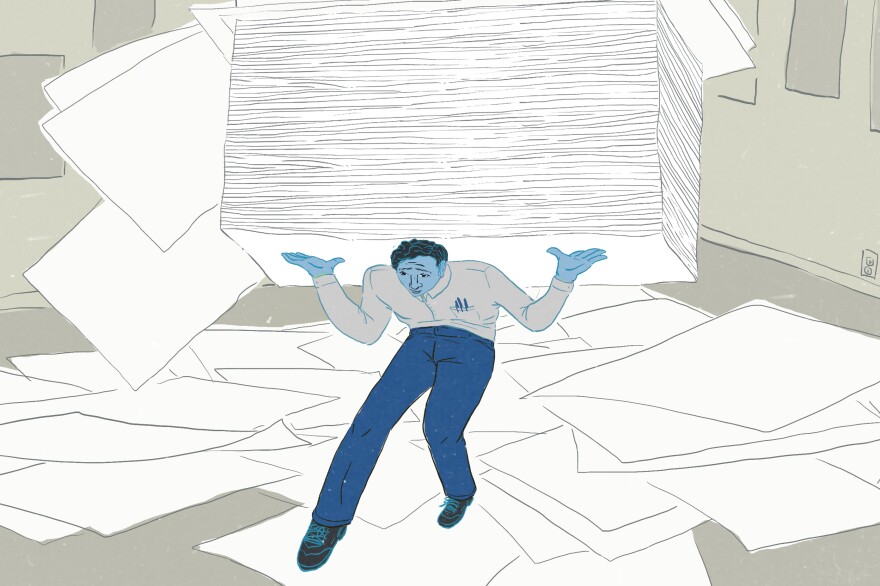There is a letter that school districts really don't like sending home to parents of special education students. Each state has a different version, but they all begin with something like this:
"Dear Parent, as of the date of this letter your child's teacher is not considered 'highly qualified.' " And then: "This doesn't mean your child's teacher is not capable or effective. It means they haven't met the state standards for teaching in their subject."
In any other subject, that's an annoying problem that suggests students may not be well-served. In special education, it means the school district is breaking the law.
The federal Individuals with Disabilities Education Act, or IDEA, requires that every student have what's known as an IEP — Individualized Education Program. And almost always, those IEPs spell out that students — either some of the time or all of the time — must be taught by a teacher fully certified in special education.
Yet around the country, that's exactly the category of teacher that's most in demand, as many states and districts are reporting severe shortages.
'Under A Microscope'
"This crisis has been coming for a long time," says David Pennington, superintendent of Ponca City public schools in Oklahoma. Many teachers there are nearing retirement and he's not sure he can replace them.
"Forget about replacing them with someone of the same quality," he says. "I'm just worried about replacing them. Period."
Pennington's rural district of 5,300 students northwest of Tulsa has been hit hard by the shortage. He says it's extremely difficult to persuade newer special education teachers to stay beyond two or three years.
"The job is not what they thought it was going to be," Pennington explains. "They feel like they're under a microscope all the time."
On top of the normal demands of teaching, special education teachers face additional pressures: feelings of isolation, fear of lawsuits, and students who demand extra attention. Many are the only special-needs teacher in their grade or their school, or sometimes in the entire district.
And then, there's the seemingly endless paperwork.
"It is not uncommon," Pennington says, "for a special ed teacher to tell me, 'I did not get a degree in special ed to do paperwork. I got a degree to help kids.' "
The IDEA and the IEP require hours and hours of filling out forms and writing reports documenting each student's progress.
"And when do teachers do that paperwork? Sometime during the hours of 3 p.m. to 10 p.m.," says Deborah Ziegler of the Council for Exceptional Children, a special education research and advocacy group. "It's like having two full-time jobs."
Solutions
So what's the answer? Aggressive recruitment, says Trevor Greene. He's the human resources director of Highline Public Schools, a 19,000-student district south of Seattle.
"Right now it's a buyers' market," he says. "Districts can't afford to wait around for the right candidate." And he's speaking from experience. When Greene started as HR director last July, he had 30 vacancies in special education to fill before school began in September.
"It was pretty ominous at the beginning," he recalls.
Greene reached out on every teacher-recruitment platform he could find. He even tracked applicants down on LinkedIn.
Eventually, all 30 slots were filled.
Greene was even able to find certified special education teachers for all of the positions, which has become a rare occurrence. Many districts are able to fill vacancies only by hiring teachers trained in general education who are willing to make the switch to a special education setting.
Betty Olson, the special education administrator for the Boise public schools in Idaho, says she was forced to hire a few general education teachers this year.
As the school year approached she was prepared to send some of her district specialists, former teachers who now train new teachers, back into the classroom to fill vacancies.
It didn't come to that. But she now has the challenge of helping a slew of new teachers adjust to the world of special education.
Olson is getting some help from Boise State University, which has created a new program designed to prepare teachers with little or no experience in special education. Candidates are put on a fast track to complete a master's degree, and they receive one-on-one support as they begin their new career.
Similar programs have popped up around the country. "I'm hopeful things will get better," Olson says.
Other administrators, like Pennington from Oklahoma, are less optimistic.
He believes we're in for a rude awakening. He expects more and more teachers to look at all that responsibility, all that pressure, and conclude that it's not worth it.
And so, he wonders, "What happens when it gets so bad that you literally cannot find anyone to be in charge of a classroom?"
Copyright 2020 NPR. To see more, visit https://www.npr.org. 9(MDAxMzY2MjQ0MDEyMzcyMDQ5MzBhZWU5NA001))



